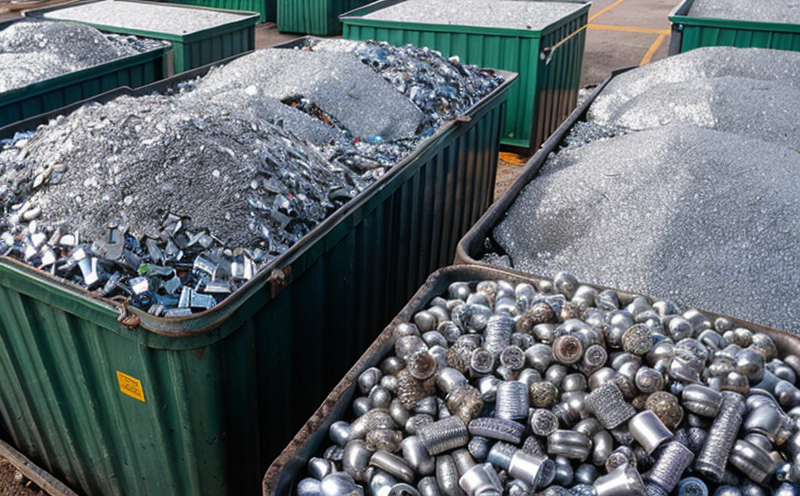ASTM E161 Recycled Alloy Density Verification
The recycling testing industry has seen significant advancements in ensuring the quality and reliability of recycled materials, particularly in sectors like metal and alloy recycling. ASTM E161 provides a standardized method for density verification of recycled alloys. This service ensures that recycled metals meet stringent quality standards, which is critical for maintaining product integrity and compliance with international regulations.
Recycling is not just an environmental necessity; it's also a business imperative. The demand for sustainable materials has increased exponentially in recent years, leading to the need for more precise recycling processes. ASTM E161 helps manufacturers and recyclers ensure that their products are fit for purpose, reducing the risk of non-compliance with industry standards.
The process involves several key steps. First, a representative sample is taken from the recycled alloy batch. This sample must be prepared carefully to avoid contamination or bias. Once the sample is ready, it undergoes a series of tests to determine its density using specific equipment and methodologies prescribed by ASTM E161.
The accuracy of these measurements directly impacts the performance of products made from these recycled materials. For instance, in automotive manufacturing, the strength and durability of parts can be significantly influenced by the precise density of their metal components. In this context, ASTM E161 ensures that recycled materials are as reliable as those extracted from virgin resources.
Furthermore, compliance with standards like ASTM E161 is essential for meeting environmental regulations and ensuring product quality. The service we provide includes not only the physical testing but also detailed reports that document the entire process. These reports can be crucial for regulatory bodies, clients, and internal stakeholders in assessing the performance of recycled materials.
Our laboratory adheres strictly to ASTM E161 guidelines, ensuring consistency and accuracy across all tests. This commitment to precision is further enhanced by our state-of-the-art facilities and experienced technical staff who understand the nuances of recycling testing.
Applied Standards
| Standard | Description |
|---|---|
| ASTM E161-18 | Standard Practice for Density Determination of Recycled Alloys by the Submerged Displacement Method. |
| ISO 9001:2015 | International standard for quality management systems. |
| EN ISO/IEC 17025:2017 | European and International standard for the competence of testing laboratories. |
The application of ASTM E161 is pivotal in ensuring that recycled alloys meet specific density requirements. This method uses a submerged displacement technique to measure the volume of the alloy, which is then used to calculate its density. The standard provides clear guidelines on sample preparation and testing procedures to ensure accurate results.
Compliance with these standards is not just about adhering to regulations; it's about building trust with customers and stakeholders. Our laboratory ensures that every test conducted follows these stringent protocols, providing clients with reliable data they can use for decision-making processes.
Competitive Advantage and Market Impact
The implementation of ASTM E161 in our recycling testing service provides a significant competitive edge. In an increasingly regulated market, companies that adhere to such standards are better positioned to meet environmental targets and regulatory requirements. This not only enhances their reputation but also opens up opportunities for new business ventures.
Moreover, the precision offered by ASTM E161 helps manufacturers develop products with consistent quality. This consistency is critical in sectors like automotive manufacturing, where even minor variations can affect product performance. By ensuring that recycled materials meet the same stringent standards as virgin resources, we help clients maintain a high level of product integrity.
The market impact of our service extends beyond individual companies. By promoting the use of recycled materials that meet these standards, we contribute to reducing waste and conserving natural resources. This aligns with global sustainability goals and helps foster innovation in recycling technologies.
Use Cases and Application Examples
- Automotive Industry: Ensuring the quality of recycled metals used in vehicle manufacturing.
- Battery Manufacturing: Verifying the density of recycled metals used in battery production to ensure optimal performance.
- Fuel Cell Technology: Assessing the integrity of recycled alloys for use in fuel cell components.
- Construction Sector: Guaranteeing the quality of recycled materials used in construction projects.
The precision and reliability provided by ASTM E161 are particularly crucial in these industries. For instance, in automotive manufacturing, the strength and durability of parts can be significantly influenced by the precise density of their metal components. In this context, ASTM E161 ensures that recycled materials are as reliable as those extracted from virgin resources.
Our laboratory provides a comprehensive service that includes not only testing but also detailed reports and recommendations for improving recycling processes. This holistic approach helps clients to optimize their operations and stay ahead of the curve in a rapidly evolving market.





